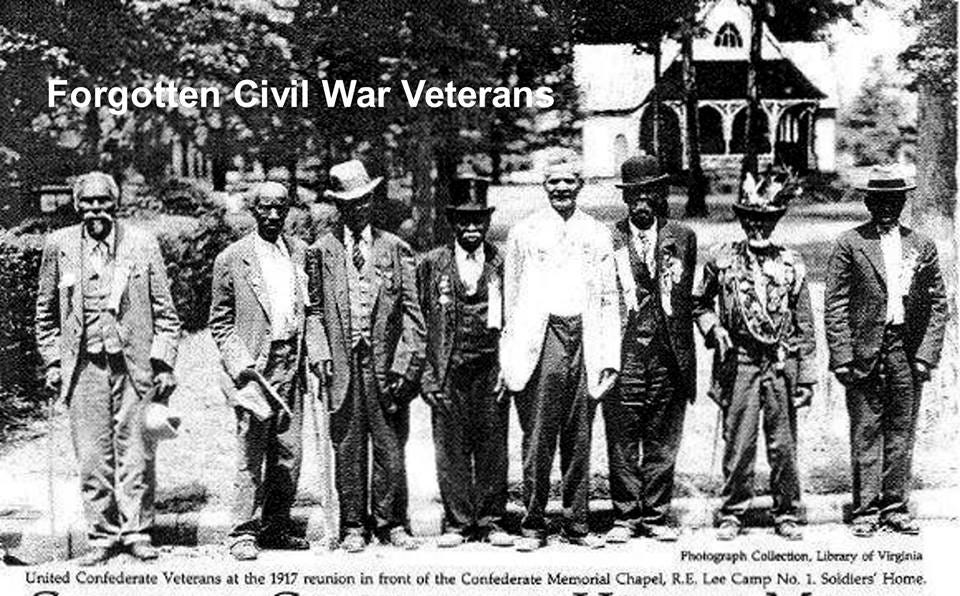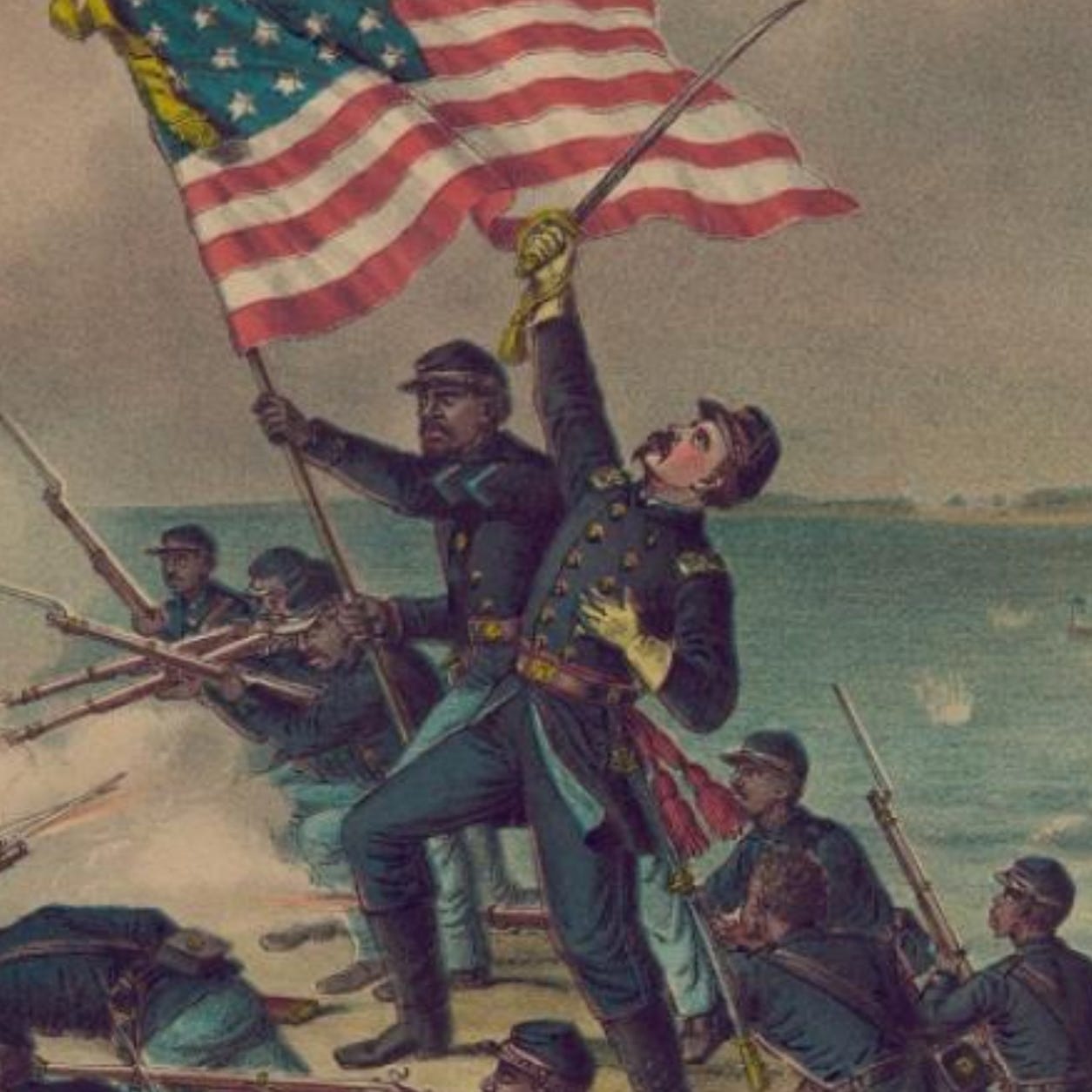One thing that I don’t miss about Twitter/X are the ridiculous memes about so-called Black Confederates and the Confederacy. They come in all shapes and sizes, but my favorites are the visual memes. This is one of my all-time favorites.
I guess you didn’t know that the Confederacy celebrated diversity to such an extent. It was a true melting pot. Some of you will notice the inaccuracies. William Taliaferro was most definitely not Mexican. The picture of Samuel French which is labelled as “French,” is just as perplexing. Samuel French was born in New Jersey and he was not of French ancestry. Benjamin Huger was born and raised in Charleston S.C. and was most definitely not Italian. There you have it. LOL
Here is another one featuring supposed Confederate “veterans” attending a reunion in Richmond. Not a single individual in this photograph was a veteran or served as a soldier. They were all body servants or what I call camp slaves and were legally attached to their masters and not the Confederate military or government.
These visual memes not only simplify the past, they often intentionally distort it to serve some current political agenda.
Thankfully, I haven’t seen these images yet on Bluesky, but that doesn’t mean we don’t have our own examples to single out. Consider this one that attempts to explain Reconstruction’s connection to our own current problems.
If only the United States had handled Reconstruction differently, so the argument goes, we would not be facing the same level of racial discord and division. Perhaps we would have ended up with a world where Donald Trump was never elected president.
A version of this argument suggests that what was needed during the postwar period was a much harsher treatment of Confederate political and military leaders, including their execution. I’ve never understood this claim. How would this be carried out? Which courts would be utilized? Military or civilian? And so on…
On one level you might conclude that there isn’t much to see here, but I actually think that these visual memes do as much damage, perhaps even more, than the above Black Confederate memes. They all simplify the past in an attempt to capture a quick and easy explanation of something salient about the present. They are both agenda driven.
Much of the problem is the embrace of a form of presentism that we apply to this history. In looking for an explanation that would change our present circumstances, we fail to appreciate the extent to which white Americans were fighting to preserve the Union and not for a social revolution that would make African Americans into full citizens. We end up judging Americans of the mid-nineteenth century by a standard or set of expectations that they either could never have acknowledged or actively resisted. Emancipation was merely a means to an end—a means to winning the war.
In short, for the vast majority of white Americans, defeating the Confederacy and reuniting the nation was their single and collective goal. That Reconstruction happened at all is remarkable given the extent of the Federal government’s reach into people’s lives up to this point.
This meme also makes a number of unfounded assumptions about how historians now think and write about Reconstruction. For one, it assumes that historians agree on when Reconstruction ended. Many historians of Reconstruction have moved beyond the crucial date of 1877 and have demonstrated that the “compromise” between president-elect Rutherford B. Hayes and the Southern states to remove occupation soldiers has been grossly exaggerated.
Most of the occupying soldiers had already been removed from the former Confederate states by 1877 and elements of Reconstruction continued in numerous states the following years.
Historians also don’t agree on how to judge Reconstruction’s successes and failures. Certainly there were failures, but we could also look at how Reconstruction helped to improve this nation in various ways. In other words, the many problems that we face today have a complicated history.
Our Next Substack Live Discussion: Office Hours
I want to thank all of you who attended last night’s Office Hours session. I used it to share some of my favorite Civil War books of 2024, but the real purpose was to help those of you who are looking to begin your study of the Civil War era.
If you haven’t already done so, download the app for your iPhone or Android for the next discussion. I send out an email just before getting started. All you have to do is click to sign on.
Here are the titles that I referenced last night:
Best of 2024
Robert Colby, An Unholy Traffic
Cecily Zander, The Army Under Fire
Don Doyle, The Age of Reconstruction
Civil War History 101: Getting Started
James McPherson, Battle Cry of Freedom
David Herbert Donald, Lincoln
Chandra Manning, What This Cruel War Was Over
David Blight, Frederick Douglass
David Blight, Race and Reunion
Bruce Levine, The Fall of the House of Dixie
Drew Gilpin Faust, This Republic of Suffering
I’ve decided to devote the next Office Hours to books about Reconstruction, specifically books that will help those of you looking to begin your study of this complicated and crucial moment in American history.
Our next Office Hours will be the last session that will be open to all subscribers. After that invites will only go out to paid subscribers. Please consider upgrading if you find value in these discussions.
Thanks to all of you for your support.








Over the years, the “dialogue” migrated from long-form blogs to the 240-word platform’s, and the memes starting pouring in. They were always around, but at least on the blogs, a heated discussion would ensue, thus, some opportunities for debunking them was allowed. Now that everything is digested at the swipe of a finger, even more fallacy is absorbed, further shifting the paradigm without challenge. while the blogs did become uncivilized at times, the owner still had control over the platform. On Twitter/X one could simply bully the other participants into silence, unmoderated. In my case, I had to take my account private, which means I lost the ability to interact with those who didn’t follow me. I don’t hold much optimism that the perestroika will last indefinitely over on BlueSky. Glad you and others stil provide a space for polite conversation.
There are two sides to this coin. The other side is the total ignorance of much of America’s past. Taken together with the oversimplification shown here, we modern day folk end up with a critical situation, one susceptible to—and as we have seen, rife with—mis- and disinformation.